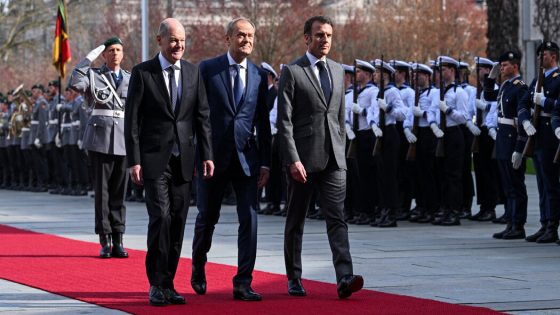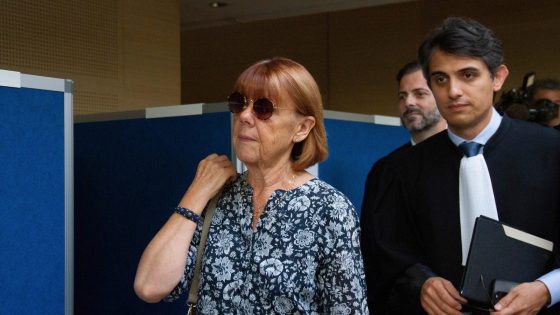Chancellor Olaf Scholz and President Emmanuel Macron of France met in Berlin on Friday looking to smooth over their differences on how to support Ukraine in its war with Russia and allay concerns that the Franco-German “engine of Europe” is sputtering.
The meetings ended in smiles, but offered little in the way of substance on the matters over which Berlin and Paris have been at odds.
At a news conference, Mr. Scholz announced new measures that built on recent meetings, such as a pledge to speed up purchases of arms for Ukraine, including tapping the world market — a slight shift from France’s earlier insistence on only buying European weapons.
He also said there would be a new “capability coalition” to prepare supplies of long-range missiles, a concept for which he provided no further detail but which may be an attempt to move past the ongoing debate over his refusal to send Germany’s Taurus missiles to Ukraine.
Mr. Scholz hosted Mr. Macron alongside Poland’s prime minister, Donald Tusk, as Europe struggles to maintain unity at a critical moment, with U.S. support for the government in Kyiv in question and advances by Russian forces on the battlefield.
“We will do everything that is necessary, for as long as it takes, to ensure Russia does not win this war,” Mr. Macron said. “We will continue to support Ukraine and its people for as long as necessary.”
“This determination is fierce, and it also calls for unity,” he added, but he ruled out “any kind of escalation.”
Mr. Tusk, who earlier this week said it fell to Paris, Berlin and Warsaw to “mobilize all of Europe,” said that the meeting on Friday “clearly shows that the nasty rumors of disputes or differences of opinion between the capitals in Europe are not true.”
In recent weeks, the differences between the allies had become unusually public and bitter, despite increasingly urgent assessments by European leaders that support for Ukraine is crucial to preventing further Russian aggression in Europe.
Mr. Macron, eager to stake out a tougher stance toward President Vladimir V. Putin of Russia, has chided allies not to be “cowards” after they strongly rebuffed his suggestion last month that NATO countries should not rule out putting troops in Ukraine. Once one of Europe’s doves on Russia, the French leader, feeling humiliated over his initial outreach to Mr. Putin, has become its biggest hawk over the last two years.
The transformation has rankled some allies. Mr. Macron’s remark was interpreted as a jab at Mr. Scholz’s government, which in turn retorted that Mr. Macron ought to put up more money or weapons to back his words.
Mr. Scholz, who has made Germany the largest military supporter of Ukraine after Washington, has argued it is now up to other European leaders to step up.
Mr. Macron, in a television interview on Thursday night, doubled down on the ideas he had voiced earlier. He told TF1 and France 2 television, that “strategic ambiguity” about how far NATO allies would go to support Ukraine was necessary to keep the Kremlin guessing.
“If, faced with someone who has no limits, faced with someone who crossed every limit that he had given us, we tell him naïvely that we won’t go any further than this or that — at that moment, we are not deciding peace, we are already deciding defeat,” he said.
“If Russia wins this war, Europe’s credibility will be reduced to zero,” Mr. Macron added. “Do you think that the Poles, the Lithuanians, the Estonians, the Romanians, the Bulgarians could stay in peace even for a second?”
French and German officials privately acknowledge there is a serious clash between the two leaders — one that reflects not just very different personal styles, but stark differences in their approach toward European security.
Those close to Mr. Scholz say that Mr. Macron fails to see that Germany cannot play with strategic ambiguity as France can: Germany has no nuclear weapons, and is dependent on NATO for its nuclear umbrella.
The trilateral talks are a revival of the so-called “Weimar Triangle,” the 1990s-era talks between France, Germany, and Poland to draw Eastern European states closer to the European Union and NATO. After lying dormant for years, officials returned to the format in the wake of Russia’s invasion of Ukraine.
This round of talks took place amid stalled negotiations in the United States. With a $60 billion aid package blocked by Republicans in Congress, President Joe Biden announced a $300 million package for weapons to Ukraine in a stopgap measure that Army accountants cobbled together from savings made from contracts that came in under bid.
Ukraine is desperate for weapons to fend off Russian advances, particularly ammunition and air defenses. Yet Europe is struggling to come up with more cash for supplies. European Union leaders on Wednesday announced a 5 billion euro, or $5.5 billion, fund for arms deliveries, but the deal allows E.U. partners to discount shipments they have already provided directly to Ukraine.
At the same time, within Germany tensions have been rising as a growing number of lawmakers push for deliveries of Germany’s Taurus missiles despite Mr. Scholz’s adamant refusals. The opposition Christian Democrats put the matter to a vote in Parliament on Thursday — a largely symbolic move because the two coalition partners to Mr. Scholz’s Social Democrats, the Greens and the Free Democrats, do not support it.
Nonetheless, the two partners have been increasingly vocal in their disagreement with the chancellor over Taurus missiles, and the debate sparked on the Parliament floor reflected growing concerns among Ukraine supporters about hesitancy in Berlin.
The divide within Germany appears to be worsening as members of the Social Democrats, who before the war were seen as being close to Russia, made arguments that sounded like an incremental retreat to their earlier pacifist positions.
Speaking in Parliament on Thursday, the head of the Social Democrats’ parliamentary faction, Ralf Mützenich, asked: “Is it not time to start thinking, not about how to conduct a war, but how to freeze this conflict and later end it?”
Norbert Röttgen, a Christian Democrat, called it an “unbelievable” proposal, writing on the social media platform, X, that it suggested the chancellor’s party was abandoning its goal of derailing Putin’s war.
Aurelien Breeden contributed reporting from Paris.
Source Agencies



